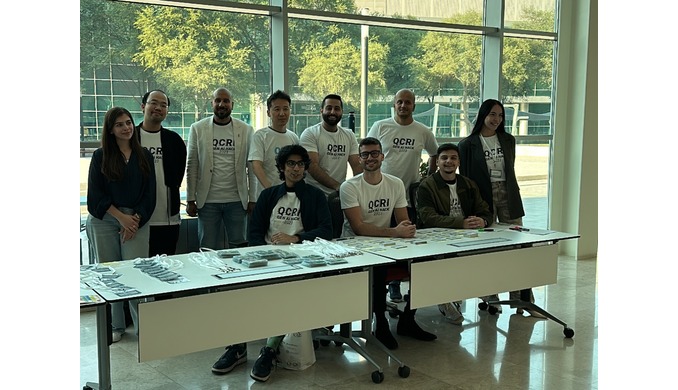With technologies that can mimic human intellect, the roadmap to the future is smarter than we think.

Auto-face detection, self-driving cars, and conversational technologies -- these applications are all set to define and govern many aspects of our lives. Their uses differ, but they were all made possible with the advent of artificial intelligence.
AI technologies are increasingly being recognized as valuable tools to society because of their ability to boost efficiency and output, while creating new opportunities for profit, cost savings and job creation.
Fake News Detection
The Qatar Center for Artificial Intelligence (QCAI), part of HBKU’s Qatar Computing Research Institute (QCRI), has been tasked with the development of highly sophisticated technologies that can simulate human thinking through its sub-groups in social computing, cybersecurity, Arabic language technologies, and data analytics.
“QCAI provides a common interface for all our internal projects that are related to artificial intelligence. It communicates our message externally, allows us to approach stakeholders with a clearer voice, and helps us recruit much-needed talent,” said Dr. Ahmed Elmagarmid, executive director of QCRI.
One of QCAI’s newest initiatives focuses on fake news detection through an open-access portal that can assess news source accuracy. The initiative is driven by advanced algorithms that place special emphasis on Arabic news sources. Although Arabic-speaking users constitute the fourth largest group on the Internet, they remain to be an underserved segment of individuals and organizations.
“Governments and the general public alike will benefit from this initiative,” said Dr. Sanjay Chawla, research director of the Data Analytics group, who also leads QCAI.
Besides research, QCAI is also helping frame a national debate around the policy and education aspects of AI in Qatar. QCAI has recently released a blueprint for a national strategy for AI which proposes six pillars of transformation, including a quest for homegrown and organic AI, which will accelerate Qatar’s vision of becoming a knowledge-based economy as envisioned in QNV 2030.
Nimble Navigation
Another initiative of QCAI focuses on designing algorithms that can automatically apply updates to road maps. This is of particular use in Qatar because of the rapidly changing transportation landscape. Sourcing GPS data from Qatar’s Ministry of Transport and Communications (MoTC), the technology aims to identify new roads based on areas deemed accessible while aligning technology and updating MoTC maps in real-time.
“The technology utilizes GPS trajectories from taxis and applies machine learning to update the map,” said Dr. Chawla. “MoTC is set to benefit from this initiative and we are looking into commercialization as the technology is quite novel.”
Drug Design
With worldwide interest shifting to personalized medicine, QCRI’s QCAI is seeking to find medical solutions that specifically cater to Qatar’s unique social composition.
Utilizing deep learning methodologies -- a subset of machine learning that can infer patterns from complex data; QCAI is working on research that can unlock the three-dimensional structure of proteins for standard drug design.
“This has vast applications in the pharmaceutical industry worldwide as understanding the structure of proteins will lead to a more efficient and focused approach to drug design,” said Dr. Chawla.
Understanding Cancer
At the College of Science and Engineering (CSE), student efforts have yielded impressive results at the ISIC 2018 challenge, which showcases some of the world’s most promising AI-based healthcare solutions in a competitive virtual setting.
Mohammed Amro, a student of CSE’s PhD in Computer Science and Engineering program in the Information Computing and Technology Division, emerged as one of 10 top innovators in the challenge, the focus of which was using AI to analyze skin lesions for cancer detection.
“ISIC is a worldwide competition initially incepted for professional medical AI researchers,” said Dr. Yin Yang, an assistant professor at CSE who is also Amro’s advisor. “Tasks assigned through the competition are both real and challenging, and the evaluation is completely objective; in each case, either your AI doctor's diagnosis is right, or it is wrong.”
“The goal of this challenge is to help participants develop image analysis tools to enable the automated diagnosis of melanoma through dermoscopic images,” said Amro, whose project achieved more than 80 percent average accuracy across all seven skin classes.
Amro’s project blends different methodologies to achieve its intended effect. “The first approach was a one-step classifier between the seven lesions types, while the second approach worked into two steps, the first step using binary classifying the lesion as either Nevus lesion (the major class in the dataset) or non-Nevus (the remaining classes), and the second step aimed to classify the remaining six lesion types,” he said.
Housing three divisions, CSE’s interest areas lie in sustainable development; information and computing technologies; and engineering management and decision sciences. The college offers 12 diverse degrees spanning a wide range of specialities, all of which were designed to meet today’s pressing needs and for generations to come.
“My studies at HBKU have inspired me to be forward-looking,” said Amro. “Quality healthcare has been long identified as key to human wellbeing; and I’m proud to be part of an institution that remains mindful of these needs.”









